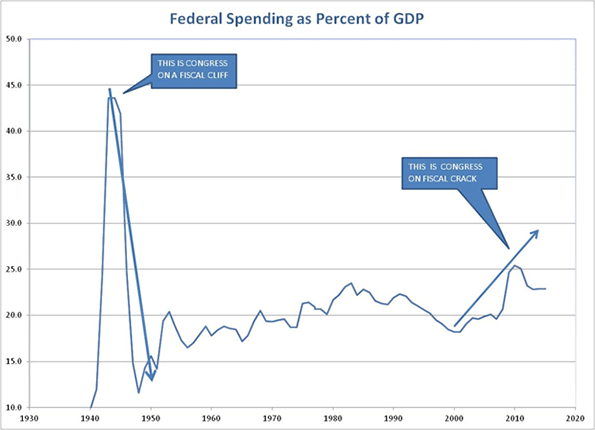
Forget about a fiscal cliff or the threat of sequestrations. Bernanke’s use of the term “cliff” in 2012 is based on the erroneous analogy that fiscal policy had been moving along some level road for a period of time and was just now approaching an “end” or “falling-off” point. The reality is that federal spending has been rising rapidly since the federal government 1) absorbed the cost of repairing the damage done by the terrorist attacks of 2001, 2) decided to support wars on multiple fronts in the Middle East, 3) bailed out the Wall Street Banks, and 4) failed to pass a budget but 5) decided to continue spending as if nothing had happened. So called “sequestration” – which in this case basically means reducing spending and increasing revenue – would simply be a return to reality, coming down to earth, getting our feet back under us. Unfortunately, we the people appear co-dependents in this addiction.

This year started with Congress succeeding at its favorite athletic event: kicking the can down the road. The January inauguration of the President and installation of their new members provided the excuse. The fact remains that Congress has not passed a real federal budget since 1997 (“the first balanced budget in a generation”.) An “omnibus spending bill” was passed in April of 2009 but that is not technically a budget.
Congressional inaction has left the federal government running on extensions (“Continuing Resolutions”) of a budget that was passed when Bill Gates was still CEO of Microsoft, NASA landed the first spacecraft on Mars, and Google was working out of a garage. The last federal budget is from the time before iPods and iPads, before SPAM e-mail exceeded legitimate email, before Facebook, YouTube and Twitter – and before the global financial crisis that sent the world into recession and US federal spending into the stratosphere.
In lieu of doing anything meaningful, three senators – Kelly Ayotte (R-NH), Ron Johnson (R-WI) and Marco Rubio (R-FL), all in office since 2011 – took the time to write and introduce an amendment to the 1974 Budget Act that would require a macroeconomic analysis of the impact of new legislation. This monumental act of denial was such a complete waste of time that GovTrack.us gave it only a 9% chance of getting out of committee and a 1% chance of being enacted. In fact, from 2011 to 2013, while we were paying these three senators and hundreds more people in Congress, only 12% of the bills introduced in the Senate made it out of committee (11% in the House) and only 14% of those were enacted (24% in the House)! Having passed just a few more than 200 bills, the 112th Congress will go down in history as even less productive than President Harry Truman’s "Do-Nothing Congress" (the 80th, 1947-1948) which nevertheless managed to get 906 bills enacted.
In the 2012 election, openings were available for 1 new president, 33 new senators and 435 new representatives. Instead, Americans re-elected the same President, 19 of the same senators (58%) and 351 of the same representatives (81%). As a result, the 113th congress looks a lot like the 112th.
Recently, President Obama signed an executive order to lift the 2009 freeze on federal employee salaries – including the salaries for all members of Congress. When Congress voted to rescind the executive order – they have to vote to prevent an automatic annual pay increase – they did it not just for themselves but for all federal employees. Then they kicked the can (of the “sequestration” spending cuts) down the road two more months.
Their final act in January was suspending the debt limit “at least until May 19”. H.R. 325 may turn out to be the bright spot in this whole mess despite the fact that it gives Geithner’s, now Lew’s, Treasury carte blanche for financing profligate spending. The “No Budget, No Pay Act” was written on Thursday January 3, 2013; introduced in the House on January 21st by Rep. Dave Camp (R-MI since 1991) and cosponsor Rep. Candice S. Miller (R-MI since 2003); passed in the House on January 23rd by a vote of 285-144; passed in the Senate on January 31st by a vote of 64 to 34.
According to the bill, if Congress does not pass a real budget by April 15, the salaries of the members of the chamber unable to agree to the budget will be held in escrow until either they pass a budget or the last day of the 113th Congress. All the new Democrat senators voted “aye”; all the new Republican senators voted “nay”. The new House members were mixed. The bill goes to President Obama this week for signature.

Assuming he signs it, H.R. 325 allows the federal government to borrow money beyond the record $16.4 trillion debt we already owe. That debt is 104.5% of 2012’s $15.7 trillion GDP. The budget deficit – which has to be covered by borrowing – is running over $1 trillion each year or about 7% of GDP. The deficit alone is 44% of federal receipts. In other words, the government is spending over 40% more than it earns! That’s your government on crack.
It is like living with a drug addict:
“Waiting for the problem to resolve itself will get you nowhere. What you are seeing now, if it isn’t already completely out of control, will get completely out of control.”
The difference is that we, the taxpayers and our children and our children’s children, have to shoulder the burden – something the families of addicts are advised not to do. In a democracy, the majority rules and the majority decided to continue to live with these fiscal crack addicts. For the rest of us, our choice has to be to try to remain optimistic – take the good news where you can find it. There are no “fiscal therapists” or “family support groups” for disgruntled voters. We must seek out the venues where we can talk about the problem openly, don’t be fooled when the fourth estate hides the crack vials to gain favor with the Washington and Wall Street elites and take care of ourselves.
Susanne Trimbath, Ph.D. is CEO and Chief Economist of STP Advisory Services. Dr. Trimbath’s credits include appearances on national television and radio programs and the Emmy® Award nominated Bloomberg report Phantom Shares. She appears in four documentaries on the financial crisis, including Stock Shock: the Rise of Sirius XM and Collapse of Wall Street Ethics and the newly released Wall Street Conspiracy. Dr. Trimbath was formerly Senior Research Economist at the Milken Institute. She served as Senior Advisor on United States Agency for International Development capital markets projects in Russia, Romania and Ukraine. Dr. Trimbath teaches graduate and undergraduate finance and economics.
Lead photo: Marion Barry smoking crack, screenshot from FBI surveillance video footage in 1990 via Wikipedia Commons.













Hmm… I read blogs on a
Hmm… I read blogs on a similar topic, but i never visited your blog. I added it to favorites and i’ll be your constant reader.
Angular cheilitis free forever review
I am always searching online
I am always searching online for articles that can help me. There is obviously a lot to know about this. I think you made some good points in Features also. Keep working, great job!
http://purereikihealingreview.com
This is really a nice and
This is really a nice and informative, containing all information and also has a great impact on the new technology. Thanks for sharing it
www.copyfight.org/girlfriend-activation-system-review-is-gfas-v2-the-most-effective-girlfriend-system-yet/
Keep up the fantastic
Keep up the fantastic piece of work, I read few posts on this internet site and I think that your web blog is really interesting and contains lots of superb information.
Edward Bass Producer
Hi! I have fable number of
Hi! I have fable number of your superior paper applaud here likewise nasty it fascinating plus it belts a numerous of perceive. Plus i loyalty your satisfy here. Thumbs up! Blockade on sharing! Bless for this apparition, it carbon help full , I wanna vote clamps for it, I parallels harmonious it, I repeat justify this arrange later, bless
at it -- or rather Not at it -- again
Once again, Congress fails to pass a budget, kicks the can down the road. How long could you keep your business going if you were still using your 1997 budget?
Follow me on Twitter: SusanneTrimbath
Puzzled at the end
I very much like your analogy of the spending binge to a drug addiction. It is so true! I was laughing in agreement with your last part, speaking about "fiscal therapists." We definitely need an "intervention." I SO wish Suze Orman would have a "Can I Afford It?" segment with some members of Congress!! It would be so refreshing, after they "show her the money" to have her get that look of disbelief on her face, telling them, "Are you crazy?! You are SO DENIED! You cannot afford this!"
The only balance I would suggest adding to your analysis is talk about the voters' role in all this. You hint at it, but you don't implicate us that much. We're definitely part of the problem!
I was puzzled with your last sentence. I get the part about "We must seek out the venues where we can talk about the problem openly," and, "don't be fooled when the fourth estate hides the crack vials...," but your link "take care of ourselves" points to the Flight 93 Memorial. The best interpretation I can take from this is you believe voters should be more disruptive to the political process, probably causing a "crash" of some sort, hurting ourselves greatly, but which will save the country. If so, I've been arguing something similar, though that analogy never occurred to me. I've been thinking that the House should put its foot down and refuse to raise the debt ceiling until either a much lower growth curve is agreed upon in spending (19% of GDP, around $2.8 trillion, max). If the Senate and the President refuse to cooperate, and that causes a default, so be it. Better now than later. IMO it's the least bad option, given the state of our political affairs. Our gov't *could* take actions that would not cause default down the road. It's technically feasible, but it would require a political reasonableness that the country simply does not have right now.
Re: Puzzled at the End
Thanks, Mark, for these thoughtful comments. To continue the analogy, the voters' role is that of the co-dependent/enabler. Like the example of the "geezer bribe" brought up earlier, the majority appear to be voting for the candidate that gets them (or at least promises them) the most.
RE: Flight 93, let me disclose that I am a founding contributor to the memorial fund. From what we know, no government authority told them what to do, or even suggested they make an attempt to prevent the flight from reaching a major US city. As you recognize, that's the "take care of ourselves" part.
Did you know that if you let your addicted child live with you, and your kid gets caught using the phone in your home to arrange the purchase of illegal drugs, your home may be confiscated under asset forfeiture laws? The problem is that addicts tend to take down the co-dependents and enablers with them -- the morbid undertone being a parallel to sending F-16 fighter jets to take down a civilian flight.
I think the time to let the economy "crash" was back in 2008 before the first bailout. On your final point, I definitely agree with you. The fiscal problems are/were surmountable; the political problems are a different matter.
Thanks, again, for your thoughtful comments and question.
Susanne
Follow me on Twitter: SusanneTrimbath
bring back PayGo
Geography student
Note that the reason we had a balanced Federal budget in the late 1990's was because of PayGo that required spending increases to be offset with tax increases. This helps voters realize that spending cost them money. As a former Republican I was amazed that the Republicans hated this as it prevented tax cuts. Them moment they got into office in 2001 they got rid of PayGo, cut taxes, increased spending and even re-nominated and re-elected the Vice President who was saying that "deficits don't matter". Certainly president George W. Bush and Cheney acted like corporate raiders, walking in, approving all borrowing, spending and tax cuts, much of which went to their cronies, then walked away from the mess they had created in 2008. Just the fact the Republican party in 2001 inherited an almost balanced budget and then broke their "contract with America" pledge to introduce a balanced budget amendment showed how irresponsible politicians have become.
The last four years has shown no leadership to get the US out of this mess.
The Republicans control the house and need to send the senate a budget that has a meaningful plan to balance the budget. A good way would be to gradually phase in PayGo again over the next four years. That way voters would have to face paying for their spending demands.
RE: corporate raiders of the lost political party
You and I seem to have taken a similar view of the doings in Washington at the end of 2008. I wrote "If some third-world leader had pillaged the national treasury on their way out of town the way Hank Paulson did ... there would be angry mobs, riots and possibly UN Peacekeepers."
I worked in Russia in the mid- to late-1990s; Matt Taibbi did, too and we talked about this in 2009. Once you've been face to face with corruption, you never forget what it looks like. It takes more than just another Act of Congress to stop it.
Thanks for reading and for posting these interesting comments.
Susanne
Follow me on Twitter: SusanneTrimbath